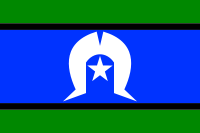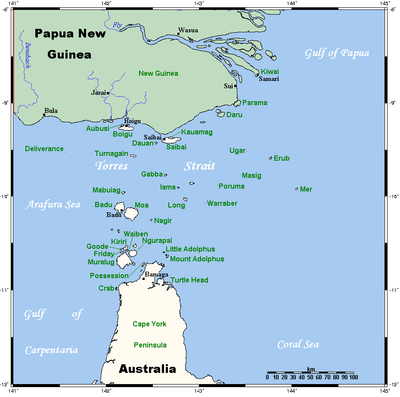Torres Strait Islanders
 |
| The Torres Strait Islander Flag |
| Total population |
|---|
| 48,000 |
| Languages |
|
see Torres Strait Island languages |
| Religion |
|
see Christianity |
| Related ethnic groups |
|
Indigenous Australians, Papuans, Melanesians |
Torres Strait Islanders are the indigenous people of the Torres Strait Islands, part of Queensland, Australia. They are culturally and genetically linked to Melanesian peoples and those of Papua New Guinea.
They are regarded as being distinct from other Aboriginal peoples of the rest of Australia, and are generally referred to separately. There are also two Torres Strait Islander communities on the nearby coast of the mainland at Bamaga and Seisia.
Contents |
Population

There are 6,000 Torres Strait Islanders who live in the area of the Torres Strait, and 42,000 others who live outside of this area, mostly in the north of Queensland, particularly in Townsville and Cairns.[1]
Culture
The indigenous people of the Torres Strait have a distinct culture which has slight variants on the different islands where they live. They are a sea-faring people, and engaged in trade with people of Papua New Guinea. The culture is complex, with some Australian elements, some Papuan elements, and Austronesian elements, just like the languages. The Islanders seem to have been the dominant culture for many centuries, and neighbouring Aboriginal and Papuan cultures show some Island influence in religious ceremonies and the like.
Archaeological, linguistic and folk history evidence suggests that the core of Island culture is Austronesian. Unlike the indigenous peoples of mainland Australia, the islanders were traditionally agriculturalists although they supplemented their food supplies through hunting and gathering.
Their more recent, post-colonization history has seen new cultural influences, most notably the place of Christianity (particularly of the Baptist and Anglican strains) which caused major shifts in cultural paradigms, as well as subtler additions through the influence of Polynesian (particularly Rotuman) pearl-divers brought by black-birders in the 19th Century.
Stories, crafts, and games
The inhabitants of Torres Strait have a long history of developing stories, crafts and games. Prominent among these are many different String figures[2][3][4] (a particular string figure game played by two or more participants that generates several string figures is familiar to people of many cultures under the name Cat's cradle), some extremely elaborate and beautiful, and 'string catches' (games in which strings are wrapped around fingers then removed quickly with a single pull).[5]
Languages
Kalaw Lagaw Ya, Kalau Kawau Ya, Kulkalgau Ya and Kawalgau Ya, which are all dialects of the Western-central Torres Strait Language (Kala Lagaw Ya), are spoken on the southwestern, western, northern and central islands. These are related to Aboriginal languages. Meriam Mir, related to Papuan languages, is spoken on the eastern islands.[6]
Notable Islanders
Famous Torres Strait Islanders include
- Eddie Mabo
- Christine Anu
- Seaman Dan
- Wendell Sailor - NRL player for St. George Illawarra Dragons
- Sam Thaiday - NRL player for Brisbane Broncos
- Brent Webb - Super League player for Leeds Rhinos and Kiwis fullback
- Robert Lui - NRL player for Wests Tigers
- The Mills Sisters
- Patrick Mills - Point guard for Saint Mary's College (California) and the Australia national team (Torres Strait Islander father, Aboriginal mother). Currently playing in the NBA as a point guard for the Portland Trail Blazers.
- Danny Morseu - Former basketball player and member of the NBL Hall of Fame
- Nathan Jawai - NBA rookie for Toronto Raptors
- Michael Bani - NRL player for North Queensland Cowboys
- Martin Nakata- First Torres Strait Islander to gain PhD qualifications
- Albert Proud - AFL player for Brisbane Lions[7]
- Andrew McLeod - AFL player for Adelaide Football Club
See also
- Indigenous Australians
- Papua New Guinea
- Torres Strait Islander Flag
- Torres Strait Island languages
References
- ↑ "Australia's Aboriginal and Torres Strait Islander peoples". Australia Now. Australian Government Department of Foreign Affairs and Trade. http://www.dfat.gov.au/facts/indg_overview.html. Retrieved 2006-12-10.
- ↑ Torres Strait string figure example.
- ↑ Alfred Cort Haddon, along with one of his daughters, the pioneers in the modern study of Torres Strait string figures.
- ↑ A string figure bibliography including examples from Torres Strait.
- ↑ A popular and comprehensive book on string figures.
- ↑ "Torres Strait Islanders". Fact Sheets. Australian Government Department of Families, Community Services and Indigenous Affairs. http://www.atsia.gov.au/Facts/docs/FS_series23.pdf. Retrieved 2006-12-10.
- ↑ AFL Record. Round 9,2009. Slattery Publishing. pg 75.
External links
- Torres Strait Regional Authority
- Church of Torres Strait
- Aboriginal and Torres Strait Islanders' virtual books - held by the State Library of Queensland.
- Aboriginal and Torres Strait Islander Social Justice Commissioner, Social Justice Reports 1994-2009 and Native Title Reports 1994-2009 for more information about Aboriginal and Torres Strait Islander affairs.
|
|||||||||||||||||||||||||||||
|
||||||||||||||